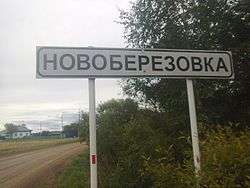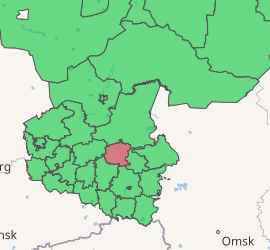Aromashevsky District
Aromashevsky District (Russian: Арома́шевский райо́н) is an administrative district (raion), one of the twenty-two in Tyumen Oblast, Russia.[1] As a municipal division, it is incorporated as Aromashevsky Municipal District.[6] It is located in the center of the oblast. The area of the district is 3,900 square kilometers (1,500 sq mi).[3] Its administrative center is the rural locality (a selo) of Aromashevo.[2] Population: 12,202 (2010 Census);[4] 14,175 (2002 Census);[8] 16,960 (1989 Census).[9] The population of Aromashevo accounts for 44.0% of the district's total population.[4]
Aromashevsky District Аромашевский район | |
|---|---|
 Entrance to village Novoberezovka, Aromashevsky District | |
.png) Flag  Coat of arms | |

Location of Aromashevsky District in Tyumen Oblast | |
| Coordinates: 56°51′32″N 68°39′16″E | |
| Country | Russia |
| Federal subject | Tyumen Oblast[1] |
| Established | 1923 |
| Administrative center | Aromashevo[2] |
| Area | |
| • Total | 3,900 km2 (1,500 sq mi) |
| Population | |
| • Total | 12,202 |
| • Estimate (2018)[5] | 10,568 (-13.4%) |
| • Density | 3.1/km2 (8.1/sq mi) |
| • Urban | 0% |
| • Rural | 100% |
| Administrative structure | |
| • Administrative divisions | 11 Rural okrugs |
| • Inhabited localities[1] | 38 Rural localities |
| Municipal structure | |
| • Municipally incorporated as | Aromashevsky Municipal District[6] |
| • Municipal divisions[6] | 0 Urban settlements, 11 Rural settlements |
| Time zone | UTC+5 (MSK+2 |
| OKTMO ID | 71607000 |
| Website | http://aromashevo.admtyumen.ru/ |
Geography
Aromashevsky District is located in the southeast of Tyumen Oblast, on very slightly hilly forest-steppe of the West Siberian Plain. The area is one of extensive wetlands - ponds, lakes, and marshes - due to the lack of water run-off from the flat terrain. 59% of the district is covered by forest, and there are a number of peat deposits and two licensed oil-and-gas tracts. About a quarter of the district is agricultural land, and 1% is water.[10] The soil is highly fertile and supports grain and vegetables. The administrative center of Aromashevo is located in the middle-western sector of the area. Aromashevsky District is 170 km east of the city of Tyumen, 300 km northwest of the city of Omsk, and 1,850 km east of Moscow. The area measures 72 km (north-south), 76 km (west-east); total area is 3,900 km2 (about 0.003% of Tyumen Oblast).[3]
The district is bordered on the north by Vagaysky District, on the east by Sorokinsky District, on the south by Golyshmanovsky District and Ishimsky District, and on the west by Yurginsky District.
History
Aromashevsky District was officially formed in November 1923. In January 1934 it was moved to Chelyabinsk Region, and later in that year to Omsk Region. By decree in 1944 of the USSR Supreme Council, the district was moved to Tyumen Oblast. In 1963 the district was abolished and incorporated into Galyshmanovsky District, but restored in 1970. [11]
References
Notes
- Law #53
- Государственный комитет Российской Федерации по статистике. Комитет Российской Федерации по стандартизации, метрологии и сертификации. №ОК 019-95 1 января 1997 г. «Общероссийский классификатор объектов административно-территориального деления. Код 71 207», в ред. изменения №278/2015 от 1 января 2016 г.. (State Statistics Committee of the Russian Federation. Committee of the Russian Federation on Standardization, Metrology, and Certification. #OK 019-95 January 1, 1997 Russian Classification of Objects of Administrative Division (OKATO). Code 71 207, as amended by the Amendment #278/2015 of January 1, 2016. ).
- "General Information" (in Russian). Aromashevsky District. Retrieved November 27, 2016.
- Russian Federal State Statistics Service (2011). "Всероссийская перепись населения 2010 года. Том 1" [2010 All-Russian Population Census, vol. 1]. Всероссийская перепись населения 2010 года [2010 All-Russia Population Census] (in Russian). Federal State Statistics Service.
- "26. Численность постоянного населения Российской Федерации по муниципальным образованиям на 1 января 2018 года". Federal State Statistics Service. Retrieved January 23, 2019.
- Law #263
- "Об исчислении времени". Официальный интернет-портал правовой информации (in Russian). June 3, 2011. Retrieved January 19, 2019.
- Russian Federal State Statistics Service (May 21, 2004). "Численность населения России, субъектов Российской Федерации в составе федеральных округов, районов, городских поселений, сельских населённых пунктов – районных центров и сельских населённых пунктов с населением 3 тысячи и более человек" [Population of Russia, Its Federal Districts, Federal Subjects, Districts, Urban Localities, Rural Localities—Administrative Centers, and Rural Localities with Population of Over 3,000] (XLS). Всероссийская перепись населения 2002 года [All-Russia Population Census of 2002] (in Russian).
- "Всесоюзная перепись населения 1989 г. Численность наличного населения союзных и автономных республик, автономных областей и округов, краёв, областей, районов, городских поселений и сёл-райцентров" [All Union Population Census of 1989: Present Population of Union and Autonomous Republics, Autonomous Oblasts and Okrugs, Krais, Oblasts, Districts, Urban Settlements, and Villages Serving as District Administrative Centers]. Всесоюзная перепись населения 1989 года [All-Union Population Census of 1989] (in Russian). Институт демографии Национального исследовательского университета: Высшая школа экономики [Institute of Demography at the National Research University: Higher School of Economics]. 1989 – via Demoscope Weekly.
- "The Region and Its Resources". Aromashevsky District (official website). Aromashevsky District. Retrieved March 4, 2017.
- "History of the Region". Aromashevsky District (official district website). Aromashevsky District. Retrieved March 4, 2017.
Sources
- Тюменская областная Дума. Закон №53 от 4 ноября 1996 г. «Об административно-территориальном устройстве Тюменской области», в ред. Закона №47 от 7 мая 2015 г. «О внесении изменений в статьи 14 и 15 Закона Тюменской области "Об административно-территориальном устройстве Тюменской области"». Вступил в силу с момента официального опубликования. Опубликован: "Тюменские известия", №220, 12 ноября 1996 г. (Tyumen Oblast Duma. Law #53 of November 4, 1996 On the Administrative-Territorial Structure of Tyumen Oblast, as amended by the Law #47 of May 7, 2015 On Amending Articles 14 and 15 of the Law of Tyumen Oblast "On the Administrative-Territorial Structure of Tyumen Oblast". Effective as of the moment of official publication.).
- Тюменская областная Дума. Закон №263 от 5 ноября 2004 г. «Об установлении границ муниципальных образований Тюменской области и наделении их статусом муниципального района, городского округа и сельского поселения», в ред. Закона №39 от 7 мая 2015 г. «Об упразднении деревни Бурмистрова Балаганского сельского поселения Викуловского муниципального района Тюменской области и внесении изменений в отдельные Законы Тюменской области». Вступил в силу 1 января 2005 г. Опубликован: "Тюменская область сегодня", №213 (без приложений), 12 ноября 2004 г. (Tyumen Oblast Duma. Law #263 of November 5, 2004 On Establishing the Borders of the Municipal Formations of Tyumen Oblast and on Granting Them the Status of a Municipal District, Urban Okrug, and Rural Settlement, as amended by the Law #39 of May 7, 2015 On Abolishing the Village of Burmistrova in Balaganskoye Rural Settlement of Vikulovsky Municipal District of Tyumen Oblast and on Amending Various Laws of Tyumen Oblast. Effective as of January 1, 2005.).